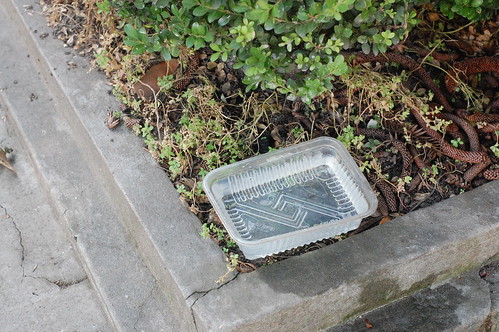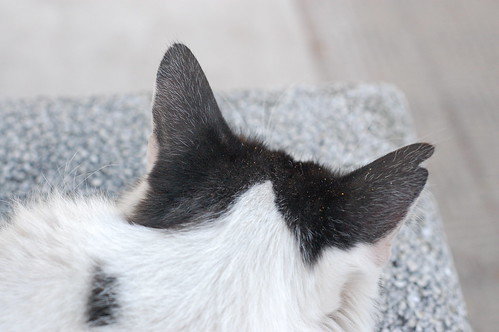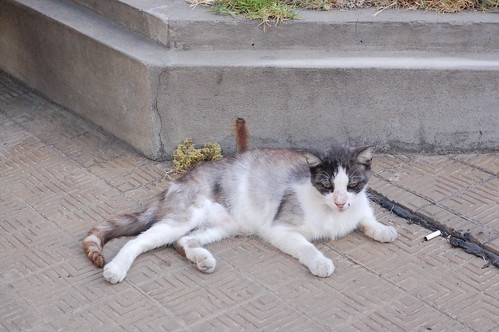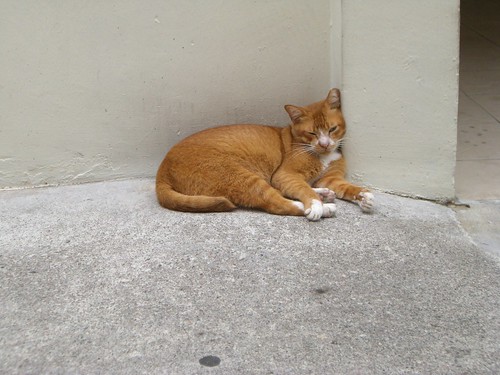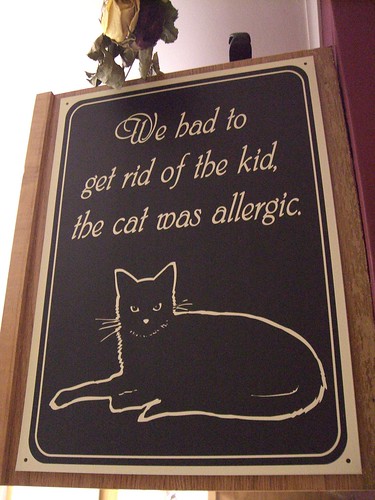There were water bowls placed discretely through the cemetery.
Thursday, December 30, 2010
Tipped ear
Most of the cats didn't look like they had tipped ears - but this one did. It looks too deliberate to be from a cat fight and looks more like a tip on the right side. Unfortunately I couldn't ask the caregiver.
Cat among the tombs
As I thought, the caregiver turned up a few minutes later and there were a group of cats waiting. The caregiver was medicating some of the cats. I asked her about the cats but she didn't speak much English and my Spanish is non-existent. I managed to gather that some of the cats have cancer of the nose.
Cat in Recoleta Cemtery
I saw this cat today at the Recoleta Cemetery in Argentina. I read before going there that there were a group of women caring for and sterilising the cats in the cemetery. This cat looked a little thin and might have some kind of skin disease - but she knew the rustle of a paper bag. I was reaching into my bag to get my camera and she thought there was food. She was also clearly waiting for someone.
Tuesday, December 14, 2010
Podcast on Mediation
Sunday, December 12, 2010
Thursday, December 9, 2010
Wednesday, December 8, 2010
Cats kill 'billions' of birds?
I did however find this interesting website from the comments section.
There was also a great article in today's Straits Times about the macaques. Substitute the word 'cat' for macaque and you wouldn't be far off.
Wednesday, December 1, 2010
Putting animals down when their humans die
Fortunately these cases are pretty rare - it's more the case that surviving relatives no longer want the animal after a relative has died, and ask the vet to put it down.
Thursday, November 25, 2010
Cat cafes
Saturday, November 20, 2010
Sunday, November 14, 2010
Cat helps Autistic child
Friday, November 12, 2010
How cats drink
Saturday, November 6, 2010
Cat Ambassadors
Thursday, October 28, 2010
Battersea Dogs and Cats Home
Wednesday, October 27, 2010
Dogs in China
Tuesday, October 26, 2010
Sunday, October 24, 2010
Humane geese control
Friday, October 22, 2010
Saturday, October 16, 2010
Friday, October 8, 2010
Search and Rescue Dog
Tuesday, October 5, 2010
Tuesday, September 21, 2010
Monday, September 20, 2010
Woman's fortune lost
It is however not an uncommon situation though the amount of money may differ. You can ask many caregivers for variations of this story - I have heard of several people who claim to have lost what savings they had and who are struggling to make ends meet. This particular case may have first resulted from SARS (as the time line seems to coincide), and as a knee jerk reaction to the killing many people reacted in a panic to try and save as many cats as they could. The problem is that the costs associated with this many cats (or indeed any large number of cats) keeps mounting. The cats grow older and inevitably grow sick and need medical care. They also constantly need food obviously - not to mention that it is almost impossible to really spend individual time with any large number of cats.
The bottom line is that while we don't know the exact circumstances of this case (and again, I can see that during SARS, situations were't exactly 'normal' for anyone - I should know because we ended up with some SARS cats too), taking in and caring for any large number of cats is a lose-lose situation. It is simply impossible to keep forking out so much money for one thing. For another, the money could have been better spent on TNRM. It would have benefited more cats in the long run. It is a shame because clearly all the caregivers who take cats in do it out of the kindness of their heart - and they often find that they end up broke and unable to care for the animals.
Another caregiver I know used to work with a mini 'shelter'. She was told that the shelter had to close because they had run out of money and all the animals would have to be killed. She took in a large proportion of those animals - but is strongly against shelters to this day, saying that they do not work. She continues working, though she probably could have retired earlier if she did not have the animals, just to keep paying the bills for the animals she took in.
Friday, September 10, 2010
Herding Cats
Thanks to Marcus for this one. I'm surprised no cats went missing/got into serious fights!
Here's the actual ad.
Monday, August 30, 2010
HDB update
The HDB has said in the past that no one has ever approached them to say they want cats in flats - but who would dare? It's like the Nazis asking Jews to please just 'register' with them during World War II.
Saturday, August 28, 2010
HDB and the cat rule
Dr Tan mentions that his flat is 'cat-proof' and that in addition to these cats, he manages the community cats in his area by carrying out TNRM in his estate. He adds that he believes the ban on cats is unfair to responsible cat owners like himself. He ends off by hoping that the HDB will listen and reconsider the ban.
Since the letter has been published, Dr Tan has been in contact with me. He mentioned that the HDB has contacted the newspaper and asked for his address.
I think it's a real shame that this continues to be an issue. Why is it still an issue when responsible people share their lives with cats within the limits of their own homes?
While we are told that Singapore has the highest percentage of home ownership, with rules like this, it goes to show that HDB flats really aren't owned by Singaporeans who live in them.
After all, how can these flats really be homes if there are rules and regulations about what can be done within the flat? I have been asked by several cat owners how the HDB can come into their home, which they have paid hard earned money for, to see if they own cats. The reason is that the home doesn't really belong to flat owners at all - it belongs to the HDB.
Now I am not aware of bylaws that restrict other activities within the home, as long as this activity doesn't bother others. Think about it - if I choose to live in a filthy home, hoard furniture and junk, and never clean the house, no one can do anything about it, unless arguably it becomes a nuisance/health concern to someone else. Even so, it would be extremely difficult to just bust into an HDB flat - I remember occasions when caregivers had thought someone in the apartment was dead - and even that took a lot of co-ordination and effort before the authorities could go in and check.
Yet if you own just ONE cat, the HDB can come in and ask you to remove your cat, and even throw you out and deprive you of your home. It doesn't matter how clean you are. It doesn't even matter that the cat has caused no trouble. All that matters is that you have a cat.
Worse - there seems to be no logical basis for this rule. The same tired arguments about cats being unsuitable for HDB flats, despite all evidence to the contrary, are trotted out again and again. Testimonials from vets, even support from the AVA on this matter, are all ignored. Yet the rule still stands.
What will it take to finally get this rule to be overturned so that responsible cat owners can live peacefully and unmolested by the HDB?
Friday, August 20, 2010
Belgium plans to sterilise all cats by 2016
The problem honestly is lack of political will in Singapore - if not, we could be done way before 2016. It's amazing how much caregivers have already accomplished on their own with barely any support - and if their hard work was carried through to its logical conclusion, based on Singapore's size, we would be done with sterilisation of all cats in a few years. Given the necessary logistics (both in terms of money and just support), Singapore could really have had a world first that we could be proud of.
Thursday, August 19, 2010
Sunday, August 8, 2010
Tigers and big cats like catnip
Tuesday, August 3, 2010
Killing of dogs in Bali ineffective in stemming rabies
As the article notes, killing the dogs is ineffective and in fact probably hurts as the vacuum effect will kick in. If you are ever in a situation where a dog seems aggressive, this article gives some tips - it also notes that ALL dogs can bite, but that they may not do so out of aggression, but out of fear.
It is also good to be careful when approaching a dog - just the other day, I bent down and offered my hand to an acquaintance's dog. However I forgot cardinal rule Number One : ask the owner first because I assumed the dog would remember me. It was twilight, and there were some other dogs barking, that stressed my acquaintance's dog out. So I got a nip on my knuckles, which was entirely my fault.
Monday, July 26, 2010
Vagabond Cat
Tuesday, July 20, 2010
Custody over the dog or cat
Wednesday, July 14, 2010
Geese
Saturday, July 10, 2010
Oscar
Wednesday, July 7, 2010
AVA says no caregivers ask to be on the cat sterilisation programme
On the other hand, since the AVA has said no caregivers have approached them, perhaps the best thing to do now is to write in and ask the AVA how you can be included on the programme. As the letter says, you can email or call - the email address is ava_cawc@ava.gov.sg as given in the letter. You may also want to copy the CEO, Ms Tan, at tan_poh_hong@ava.gov.sg and the Chairperson at sookeong.koh@ecosave.sg.
Saturday, June 26, 2010
Prosthetic paws
Tuesday, June 22, 2010
Wednesday, June 9, 2010
What to do in cases of animal abuse
Here I'm dealing with a case where the abuse is not on-going, and where you have found an injured or dead cat :-
1. Way before you ever (and hopefully you never do) encounter an abused cat, get familiar with the laws relating to animal abuse. You will likely be emotional and upset when you see an injured/abused or dead cat - it's best to familiarise yourself with the laws when you are in a steadier frame of mind.
The resources are all available online. You'll want the Animals and Birds Act - and specifically Section IV. I'm not linking to the Act directly in case there are any changes to the legislation - which will result in broken links.
You'll also realise that cruelty to animals extends to other situations rather than straight out abuse - ie where the animal has been battered or harmed.
You may well need to refer to the legislation again when you do come across an abused animal, but you'll at least have some kind of impression of what is covered and what isn't.
2. Stay calm - you've just seen something distressing and it's completely normal to be very upset or to panic. Take a deep breath and remember that everything you do right now makes it easier if you are able to prosecute.
3. If the animal is alive - take it to the vet immediately. If the animal is dead, don't touch it. Take photos if you can and make as many notes of the scene as possible.
4. Take the animal to the vet for a necropsy - you can also wait for the AVA or SPCA to do it, but the faster you get to a vet for a necropsy, the more details you get. In a tropical climate, decay sets in fast and it may soon be difficult to determine the cause of death.
5. Prepare your information. If you have photos, a vet report, etc, make sure to prepare all the information and bring it with you. If you have witnessed anything (even if it's just discovering the body), take a few minutes to sit down and write out a statement. Don't jump to conclusions - just state what you saw/when it happened/what you did. Also, it's helpful to carry a copy of the relevant legislation. You'll need this for the next step.
6. Make a police report.
This is the point that most people seem to get stuck on because often, you'll be told that the police do not handle animal abuse cases. People have been told quite often to call the SPCA - and when I was with CWS, we actually had a meeting with the police to clarify this. The police DO investigate. It also says so in the statute. The officers are likely to call AVA. You may want to inform the AVA yourself as they will probably be conducting the investigation and they do have the powers to investigate.
The reason it is a good idea to write your statement before heading to the police post is that in my experience, it's more efficient. Otherwise you, or whomever is making the statement ,has to give it to the office on duty. In the cases where I've seen someone give a statement (or where I've given one), there have been errors, either grammatical or factual that need to be corrected. Having a written or typed statement minimises the time you and the officer taking your statement needs to spend.
If an officer tells you that you cannot make a report, or that it is someone else's jurisdiction, you may want to show him or her the legislation. You may also wish to escalate it to a superior officer - most of them are much better informed.
You can also apparently lodge a report online but these are for non-urgent cases.
Bear in mind, only a witness can make the report - so if someone tells you that they saw a cat abused, only that someone can make the report. You cannot.
You may wish to inform the relevant welfare groups - and it's a good idea to do so, but they cannot investigate or prosecute.
6. When you make a report, get a case number. Also ask which officer is going to be in charge so you can follow up with him or her.
Wednesday, June 2, 2010
Thursday, May 27, 2010
Cost of TNRM versus killing
I know it's difficult to find out how much it costs when the cats are caught and killed because AVA has not been very forthcoming with their figures. Except for one newspaper article in the New Paper years ago, I've never really seen an estimation of the costs. However from calling pest control companies, you can get a rough estimate of how much it would cost (and calling a pest control company isn't cheap if you're calling privately - one would imagine that contract rates are cheaper). Of course if you know someone within the TC, or the pest control company, that is an even better source of data.
Bear in mind though, that these costs do not take into consideration how much is saved in terms of mediation and the fact that TNRM is not one-off. It does take a lot of time and effort on the part of caregivers. Factor in that most caregivers are even willing to pay for sterilisation, and it's not difficult to see that TNRM is the most economical way to go.
Saturday, May 15, 2010
Wednesday, May 12, 2010
Fear of failure
So far, despite lack of official support, and in fact a 'no-stray' policy, the number of cats killed has been dropping - it's now half what it used to be. Can this drop be attributed to killing? It is highly unlikely because that number has not dropped despite more than 25 years of killing - it's always stayed at around 13000.
One could argue it's a blip in the data, but the numbers started falling a while ago - a few years after the SCRS was launched. We've always maintained that sterilisation is a medium to long-term method of population control, and we started to see that the number of cats killed started dropping - in fact, just before SARS hit. It went back up during SARS - but came down again. Now the latest numbers show that the number of cats killed has dropped to 6500.
Now I know some town councils will say that the reason this is so is that they have been more supportive of caregivers' efforts and try not to trap. While this may well be the case, I also seriously doubt that they would not trap if they were having insurmountable problems dealing with complaints. That has always been the agreement with every TC I know - that if a complaint cannot be resolved, the TC can (and will) go in and trap. I can only conclude that less cats plus better mediation is leading to less complaints and therefore less trapping overall. As a result, less cats are dying.
So the question remains - why aren't more efforts put into TNRM? With a relatively small cat population and caregivers who are already putting in their own time, money and effort, why not invest MORE money and make a concerted effort to sterilise our community cats? I've said it before, and I think it bears repeating - Singapore is small. We could well manage the community cat population in a more effective and humane way. I don't see being a No-Kill nation being beyond our reach.
So why the reluctance? The reason, I believe, lies in the fact that the people who get to make these decisions are afraid of failure. Singapore always has to be Number One - but we don't want to be the first to do it. Look at the F1 Night Race, or the Casinos as two recent examples. We want to be able to point at other countries who have already done it, and then try and perfect what they've done. There's merit in that of course - but it's the same reason we will never be innovators. You can't be truly entrepreneurial or visionary without having failed along the way.
So what will it take for us to embrace failure? Maybe we need to also realise that being Number One isn't as important as being a pioneer. Let others perfect being a No-Kill nation - but for once, maybe we can be the trail blazers, even if it means that along the way, we might fail.
Tuesday, May 11, 2010
Monday, May 10, 2010
Cats and TNR
Friday, May 7, 2010
SMS hoax
Monday, April 26, 2010
Number of cats killed last year
I just heard from a very reliable source that the number of cats killed last year went down again. As many of you know, the number dropped from 13000 to 10000. Last year, it went down further to 6000. While that's still a lot of cats, and those deaths are preventable, it does show that progress is being made.
We've talked so often about sterilisation being a medium to long term solution - and I think we're really starting to see the results now. Even friends who aren't cat caregivers have mentioned to me that they're seeing more and more sterilised cat.
So caregivers give yourselves a HUGE pat on the back. There's still a ways to go - but we're getting there.
Wednesday, April 21, 2010
Dogs at Pasir Ris Farm
I can understand why Mr Tan and his friends wanted to get the dogs out of the kennel, especially given what a bad situation the dogs sound to have been found in. It is human nature especially when one cares for animals to try and get them out of a horrible situation. In addition, it does seem as if the AVA had been called in, but that they hadn't done anything earlier on.
The problem though, as Ricky from ASD pointed out, is that it might actually incentivise other breeders who are making a loss or just don't want to continue in the business of breeding any more. In fact, if someone wants to get out of the 'pet breeding 'business', he or she just has to neglect the dogs, bring it to the attention of some kindhearted people who will come and take the dogs off his or her hands. All that, and a cash payout too. True - it may not repay the cost that has been sunk into the 'business', but it sure is one way to minimise losses.
Not only that, the breeder faces no penalties. There is nothing to stop him or her from starting another breeding enterprise down the road - possibly even using the money that he or she has been paid to take the dogs out. The breeder hasn't been shut down at all - this particular venture has been, but that's it.
In the meanwhile, the well-meaning people who have taken the dogs in will have the mammoth task of trying to rehome almost 80 dogs, most of whom will probably not have to find homes because of their ill health. So they're looking at probably having to euthanise most of these animals - and that's something rescuers really shouldn't have to do. It's not rescue if most of the animals end up dead anyway - and the rescuers end up broke and disillusioned. Of course, I hope for the best for the dogs but I am not hopeful.
Friday, April 16, 2010
Thursday, April 8, 2010
Skating for cats
Monday, April 5, 2010
Thursday, April 1, 2010
Wednesday, March 24, 2010
Giving up a cat because of a child
What DOES bother me though are the people who still think that just in 'case' a child is allergic, an animal should be tossed out of the house. I remember a couple who came to adopt a cat. The then-fiancee was obviously less interested in the cat but was agreeable to the adoption. Things got worse after they got married - and the minute they had a baby, the cat was tossed out. Not because the baby was allergic - just because it was a cat and it had to go.
People often wonder why it is that children seem more allergic these days than in the past - as many of you know if you've been reading the blog long enough, I think it has to do with desensitisation. Farm studies seem to back this up.
Thursday, March 18, 2010
Tuesday, March 16, 2010
Fresh Air Fund
Monday, March 15, 2010
Possibilities
Consider this - just because your colleague doesn't spread some massively contagious and dangerous disease to you today doesn't mean it won't happen tomorrow. Similarly, just because we haven't seen aliens attack Earth doesn't mean it won't happen. Can these things happen? Of course - but how likely are they to happen? In the meantime, you're far more likely to be killed in a car crash then you are by some as yet unknown and non-existent pigeon disease.
Thursday, March 11, 2010
Cats at care community
This morning I went down to a care community - a senior living community. It's a beautiful place with huge gardens and wide open spaces. There are also many facilities including a full dining room and function rooms. They also have regular movie screenings, music performances and speakers who come in. I walked around with one of the caregivers and she seemed to know most of the people there. One of the nice things about this place is that if someone should move in and run into financial difficulties, they have a fund to ensure that no one has to move out.
It is also home to several cats. I went down to speak with some of the caregivers about getting all the cats sterilised. Several of the cats have already been done - but there are still a few that haven't been sterilised yet. Now the challenge will be getting the ones that are more trap shy and handling some of the issues that have arisen. One of those issues is that some of the cats have had kittens in the roofs of some of the homes. Another is the location of the feeding spots.
Here are some of the caregivers watching the Alley Cat Allies video. I was also treated to a delicious home cooked meal by one of the caregivers - which goes to show caregivers are hospitable to all :)
Monday, March 1, 2010
X-Files cat
Wonderful print that a friend got me - you can see some more of the prints at this website!
Friday, February 26, 2010
Australian cats
Now I can understand the need to protect other wildlife - though I hate the fact that 'native' wildlife is supposed to be more 'important' somehow than other wildlife. If we're talking about 'native wildlife' than nothing is less native than us humans. Australia, Singapore, the US and many other countries are nations of immigrants - the animals were there way before us, and if we left the area untouched, I think ALL the animals would fare better. In addition, look at the native kangaroo and the damage it causes - somehow I doubt it's 'native' status will protect it if economic interests are involved in the long run.
As I said though, I can see that damage to animals and property may be an issue. For example, I love foxes and have some in my yard - but I don't have animals that may be hunted by the foxes. I do have a friend who has chickens though - and he doesn't want the foxes to get at his chickens. The farmer I just met has the same issue - foxes got at his ducks. The solution? Not to kill the foxes - but both installed electric fences that keep foxes out.
Now I'm sure Australia's wildlife issues are vast and there are many concerns that we may not be familiar with, having not lived there. However, I don't see how killing the feral cats will help. If trapping for a TNRM programme is intensive and time consuming, what about trapping to kill?
Furthermore, while the Invasive Animal Co-Operation Research Centre states that cats threaten certain species of wildlife, on another website also managed by them, it also states that 'well quantified evidence of their impact on native wildlife on the Australian mainland is lacking'.
It further goes on to state that 'Feral cats have occupied tropical Australia, Tasmania and Kangaroo Island for well over 100 years but there have been virtually no extinctions of native animals on which feral cats prey in these areas. Feral cats may become an important factor when other factors such as land clearing and other forms of large-scale habitat degradation have restricted remaining populations of native wildlife to small island populations.' (bolding mine).
Note also that it states that the feral cat population is self-sustaining and stray and home cat populations add almost nothing to the feral cat population.
So what is really the problem here? The feral cats, which have caused virtually NO extinctions - or the land clearing and large-scale habitat degradation?
I hope that this article has just been mis-reported. Should more studies be done on the impact of cats? Absolutely. But should they be skewed or demonised without any solid evidence? Also, shouldn't a long term solution be found - removing and killing the cats, whether by toxins or any other method isn't going to solve the issue of cats reproducing.
Paid volunteers?
Then she very nicely asked if she could reimburse me for my travel expenses at least. No one has ever asked me that before - perhaps they assumed that since I was an employee of CWS that I had a transport allowance (I didn't) - nor has it happened anytime I've volunteered either :)
Thursday, February 25, 2010
Cats on the farm
Some of you may remember that I mentioned reading a book, Eating Animals, that left an impact on me.
I've never been into food just because it's organic or free range - mostly because those terms are so badly defined/regulated that they really don't mean anything, except to mean you pay more in the supermarket.
I'm fortunate to find myself living now within access of some farms so we went down over the weekend to visit one of those farms and pick up eggs. It's too snowy for the chickens to come out and walk around on the pasture right now (and the clear path that the cats are lying on are because the path was cleared), but they were allowed out around the egg-mobile. We picked up some eggs - and farm fresh eggs really do taste the best.
One of the other interesting things was that the farmer and his family had feral cats that lived in the barn - they were moved there by a cat rescue. Here are the cats rolling in the sun - I also got to see a cat dig and bury in snow for the first time :)
Monday, February 22, 2010
Got rid of the kid
We cat-sat for a friend this weekend and I saw this sign, which made me laugh. It reminds me of all the people who give up their cats because their children are 'allergic' - ie people who give up their cats 'just in case' even if their children haven't been shown to be allergic to cats.
Saturday, February 20, 2010
Law and Order Canines
Tuesday, February 16, 2010
Happy Chinese New Year!
Thursday, February 11, 2010
Intelligence in dogs
Wednesday, February 10, 2010
Cat storage
Interestingly as well, more people would choose to spend time with their pet than their partner.
Wednesday, February 3, 2010
Nothing creepy about Oscar
Monday, February 1, 2010
Cat complaints and the HDB
Also, the Minister mentioned that often in private disputes, it is one person's word against another's and that it is often not clear who is in the wrong. In addition, he mentions that it is not possible for the HDB to resolve private disputes between residents.
I wonder what then is the rationale for the bylaws that ban cats - considering that it affects such a tiny portion of the HDB population and based on the fact that the Minister has said that the HDB doesn't step into private disputes. I agree that it is not HDB's job to step in when it comes to private disputes - but what can be more private than your decision to own a cat?
Thursday, January 28, 2010
Ketamine recall
Wednesday, January 27, 2010
Eating Animals
Tuesday, January 19, 2010
Crows
Friday, January 15, 2010
Polish 'speaking' dog
Thursday, January 14, 2010
Dog and Cat People
I've had this discussion with people before - are dog and cat people different in terms of personality? A new study seems to suggest they may be.
How accurate do you think this is in terms of your personality?
Friday, January 8, 2010
Cats and dogs
Wednesday, January 6, 2010
Tuesday, January 5, 2010
Cats and rats
Eliminate the cats - and rats are likely going to follow.
